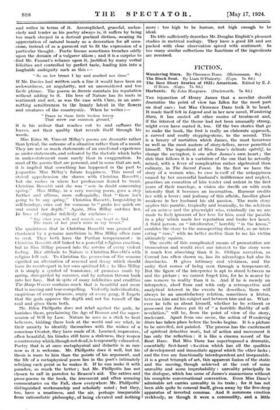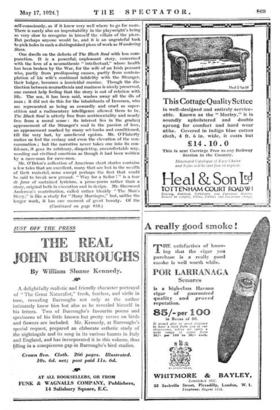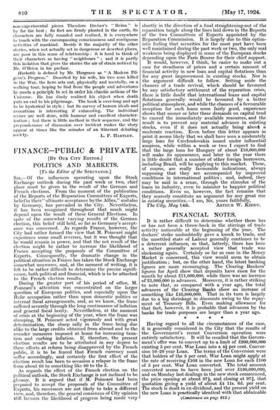FICTION.
The Best Short Stories of 1923: American. Edited by E. J.
O'Brien. (Cape. 7s. 6d.)
Harbottle. By John Hargrave. (Duckworth. 7s. 6d.) THE injunction of Henry James that a novelist should dramatize the point of view has fallen for the most part on deaf ears ; but Miss Clemenee Dane took it to heart. It made itself felt in Legend and in her new novel, Wandering Stars, it has ousted all other modes of treatment and, if the interest of the theme had not been unusually strong, might even have ousted it, too. Of the two stories that go to make the book, the first is really an elaborate approach, a carved and costly stepping-stone, to the second. This is a luxury of narration which James, the most luxurious as well as the most austere of story-tellers, never permitted himself. The ingredient of Miss Dane's delicate aperitif, to change the metaphor, is one after James's own heart ; the dish that follows it is a variation of the one that he actually mixed, with a fever of complication rather algebraical than culinary, in The Sacred Fount. In the first we have the story of a woman who, to ease herself of the unhappiness caused by her successful husband's indifference and neglect, practises an evocation of him tender and ardent in the first years of their marriage, a vision she dwells on with such intensity that it becomes an incarnation. Rumour credits her with a lover ; and jealousy of this affable, familiar ghost awakens in her husband his old passion. The main story applies this parable, tragically and ironically, to the relations of an actress and the playwright who, criminally (as we are made to feel) ignorant of her love for him, used the parable in a play which made her reputation and broke her heart. A third person, an " interlocutor," horribly " in the know," confides the story to the unsuspecting dramatist, as an inter- esting " case," with no better motive than to see his victim ultimately squirm.
The merits of this complicated means of presentation are tremendous and would rivet our interest to the story were it much less absorbing than it is. Oblique narration, as Conrad has often shown us, has its advantages but also its drawbacks. It gives intimacy and vividness, and the unity that comes of being seen through a temperament. But the figure of the interpreter is apt to stand between us and the picture ; we cannot forget him, for he is nearer by one remove to reality than it is. And if he is merely an interpreter, aloof from and with only a retrospective and analytical interest in the events he describes, there will always be an unsatisfactory relation, sometimes a hiatus, between him and his subject and between him and us. What- ever he tells us about himself, whether he be reticent or possessed (as James put it) of " a horrible fluidity of self- revelation," will be, from the point of view of the story, irrelevant. Apart from one scene, the action of Wandering Stars has taken place before the books begins. It is a picture to be unveiled, not painted. The process has the excitement of spiritual detective work, but of action and movement it has only the reflection : it is like a cinema record of the Boat Race. But Miss Dane has superimposed a dramatic, essentially first-hand E;inpation which has all the qualities of development and immediate appeal which the other lacks ; and the two are functionally interdependent and inseparable. It is a great triumph of art, this apparent fusion of the static and the moving, though achieved at the cost of some unreality and some improbability : unreality principally in the dialogue, which has some of James's mannerisms without his complete conversational convention. Even Miss Dane's admirable art carries unreality in its train ; for it has not been able quite to conceal itself, given away by the five-deep apparatus of inverted commas. And it summons emotion recklessly, as though it were a commodity, and a little self-consciously, as if it knew very well where to go for more. There is surely also an improbability in the playwright's being so very slow to recognize in himself the villain of the piece. But perhaps anyone would be, and it is an ungrateful task to pick holes in such a distinguished piece of work as Wandering Stars.
One dwells on the defects of The Black Soul with less com- punction. It is a powerful, unpleasant story, concerned with the love of a neurasthenic " intellectual," whose health has been broken by the War, for the wife of an Irish peasant who, partly from predisposing causes, partly from contem- plation of his wife's continual infidelity with the Stranger, their lodger, becomes a homicidal maniac. Though the dis- tinction between neurasthenia and madness is nicely preserved, one cannot help feeling that the story is out of relation with life. The sea, it has been said, washes away all the ills of man ; it did not do this for the inhabitants of Inverara, who are represented as being as cowardly and cruel as super- stition and a rudimentary intelligence allowed them to be. The Black Soul is utterly free from sentimentality and nearly free from a moral sense : its interest lies in the gradual appeasement of the Stranger's soul in the passion of love, an appeasement marked by many set-backs and conditioned, till the very last, by unrelieved egoism. Mr. O'Flaherty makes us feel the ecstasy and even the elevation of the con- summation ; but the narrative never takes one into its con- fidence, it goes its arbitrary, disquieting, uncomfortable way, weeding out civilized emotions as though it had been written by a cave-man for cave-men.
Mr. O'Brien's collection of American short stories contains a few tales that arc excellent, many that are lost in the wealth of their material, none except perhaps the first that could be said to break new ground. " Way for a Sailor 1 " is a tour de force of sustained lyricism, a prose-poem rather than a story, original both in execution and in design. Mr. Sherwood Anderson's contribution, called rather bleakly " The Man's Story," is like a study for "Many Marriages," but, unlike the longer work, it has one moment of great beauty. Of the (Continued on page 810.)
non-experimental pieces Theodore Dreiser's " Reins " is by far the best ; its feet are firmly planted in the earth, its characters are fully rounded and realized, it is everywhere in touch with the encompassing consciousness and contiguous activities of mankind. Beside it the majority of the other stories, when not actually set in dangerous or deserted places, arc poor in this sense of relationship : it is hard to think of their characters as having " neighbours " ; and it is partly this isolation that gives the stories the air of strain noticed by Mr. O'Brien in his preface.
Harbottle is defined by Mr. Hargrave as " A Modern Pil- grim's Progress." Deserted by his wife, his two sons killed in the War, the hero sets out, physically and mentally, on a walking tour, hoping to find from the people and adventures he meets a principle to set in order his chaotic notions of the Universe. He has dimly realized his object when death puts an end to his pilgrimage. The book is over-long and apt to be hysterical in style ; but its survey of human ideals and
avocations is interesting if exhausting. The individual scenes are well done, with humour and excellent character- Lation ; but there is little method in their sequence, and the preponderance of discussion over incident makes the story appear at times like the minutes of an itinerant debating




















































 Previous page
Previous page